CALL TODAY 646-846-1136 | EMAIL
Surgical Experts Dedicated to Improving Lives
At Lenox Hill Minimally Invasive Surgery PLLC, Dr. Valery Dronsky and his staff of medical professionals provide compassionate care with the highest ethical & professional standards. In our state of the art facility, we offer surgical services using only the most cutting edge and current procedures and treatments. We specialize in general surgery, including extensive experience in performing hernia repair surgery. Our expertise is in minimally invasive surgery and robotic surgery. Minimally invasive and robotic surgery often allow patients to experience easier recovery than traditional open surgery. They also allow for more precise and less traumatic surgery. When robotic and minimally invasive surgery is not an option, we are also skilled and experienced in traditional open surgical procedures.
Dr. Dronsky is an experienced and highly skilled surgeon having undergone extensive training in school, residency and fellowships. He practices medicine with ethical behavior, compassion and superb bedside manner. In the operating room he exhibits precision mechanical abilities, analytical thinking and the ability to visualize tissue in three dimensions. These innate and learned skills allow Dr. Dronsky to be one of the most dexterous and skilled professionals in New York City and the Country.
Call us: 646-846-1136
PATIENT TESTIMONIALS
Recent Awards
We are honored and deeply appreciative to have consistently received prestigious awards and recognition year after year, establishing us as one of New York’s foremost hospitals for a wide range of general surgeries, safety measures, specialized procedures, and overall excellence in healthcare. At Lenox Hill Minimally Invasive Surgery, our unwavering commitment lies in delivering exceptional care and unwavering support to our patients, guaranteeing their safety and successful recovery throughout their entire surgical experience.
Hospital Quality Awards
 America’s 50 Best Hospitals Award™ (2023, 2022)
America’s 50 Best Hospitals Award™ (2023, 2022)
Top 1% in the nation for providing the highest clinical quality year over year.

America’s 100 Best Hospitals Award™ (2021)
Top 2% in the nation for consistently delivering clinical quality year over year.

America’s 250 Best Hospitals Award™ (2023, 2022, 2021)
Top 5% in the nation for consistently delivering clinical quality.

Patient Safety Excellence Award™ (2023, 2022)
Top in the nation for providing excellence in patient safety by preventing infections, medical errors, and other preventable complications.
Specialty Clinical Quality Awards

America’s 100 Best Hospitals for Cardiac Care Award™ (2023, 2022, 2021, 2020, 2019)
Superior clinical outcomes in heart bypass surgery, coronary interventional procedures, heart attack treatment, heart failure treatment, and heart valve surgery.

America’s 100 Best Hospitals for Coronary Intervention Award™ (2023, 2022, 2021, 2020, 2019)
Superior clinical outcomes in coronary intervention procedures (angioplasty with stent).

America’s 100 Best Hospitals for Prostate Surgery Award™ (2023, 2022, 2021)
Superior clinical outcomes in prostate removal surgery and transurethral resection of the prostate.
Click to see all of our Healthgrades best doctors awards
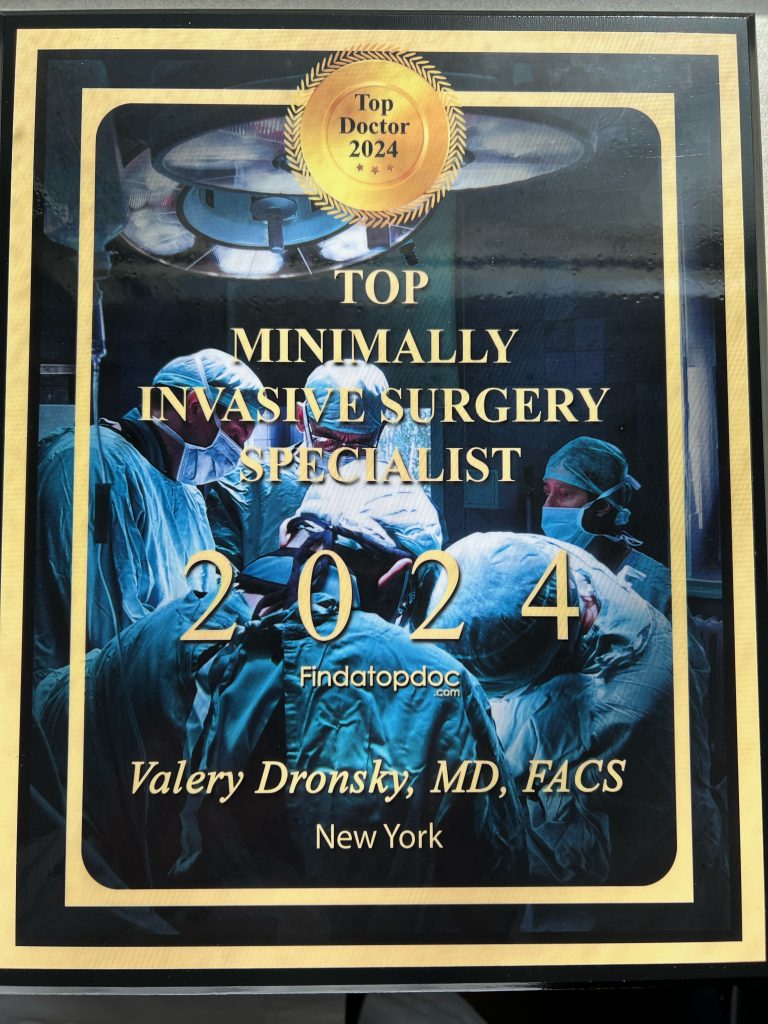
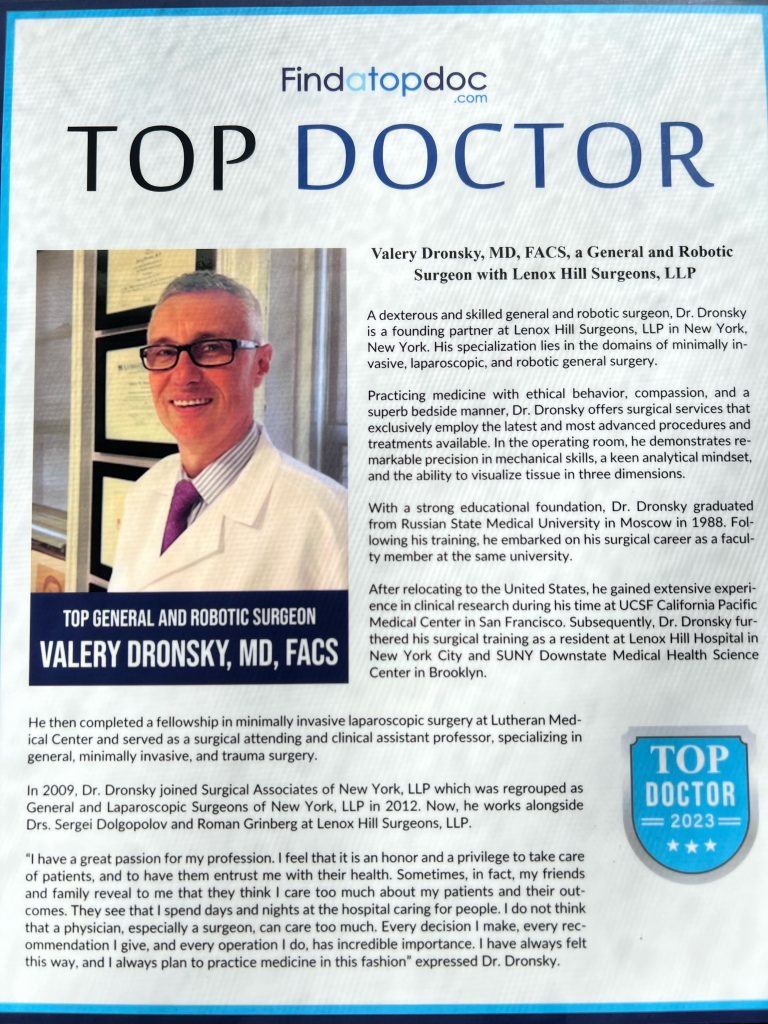


Visit our main website at www.LenoxHillMinimallyInvasiveSurgery.com
Blog Posts are Below:
Monthly Archives: February 2019
Colorectal Cancer Surgery: Steps, Benefits, Side-Effects, Precautions & Prognosis
Colorectal Cancer Surgery
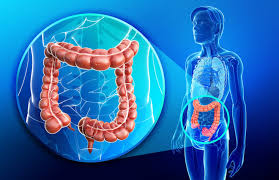 When cells and tissue of your rectum and colon undergo neoplasm and start metastasizing, you could be diagnosed with colorectal cancer. Approximately 140,000 men and women are diagnosed with colorectal cancer annually which makes the malignancy one of the most prevalent forms of cancer. Surgical intervention is the best and most widely used treatment technique for dealing with colorectal cancer, usually preceded or succeeded by radiation and chemotherapy.
When cells and tissue of your rectum and colon undergo neoplasm and start metastasizing, you could be diagnosed with colorectal cancer. Approximately 140,000 men and women are diagnosed with colorectal cancer annually which makes the malignancy one of the most prevalent forms of cancer. Surgical intervention is the best and most widely used treatment technique for dealing with colorectal cancer, usually preceded or succeeded by radiation and chemotherapy.
Though the colon or rectum could metastasize separately, both cancers are referred collectively owing to their exhibiting common traits. Cancer of the colon is more prevalent than rectal cancer.
Surgical options and methods
There are numerous types of colorectal cancer surgery based on the specific area of the large intestine that becomes cancerous. Some of the most common forms are:
- Ileocolectomy/right colectomy – In lleocolectomy, the ileum, lying on the colon’s right end is removed together with the colon’s right section. During a right colectomy procedure, only the colon’s right part is eliminated.
- Partial colectomy – In partial colectomy, only a specific section of the colon is expunged, as the expression indicates. After the malignant part is removed, the residual components are reconnected using a procedure known as anastomosis in medical parlance. Your bowel movement is usually not affected when you undergo partial colectomy.
- Total abdominal colectomy – Excision of the large intestine in entirety is referred to as total abdominal colectomy.
- The proctosigmoidectomy – proctosigmoidectomy procedure entails excising the infected part of the sigmoid colon and the rectum.
- Total proctocolectomy – The colon and the rectum is completely removed in a total proctocolectomy operation. In case, the anus is left intact, and its functioning is smooth, then the surgeon devises an ileal pouch shaped like the letter ‘J’ that stores feces temporarily until you defecate it.
- Abdominoperineal resection – Abdominoperineal resection involves the removal of the sigmoid colon, rectum, and anus followed by colostomy procedure for facilitating stool discharge.
Benefits
Surgeries are carried out either through the open mode or the minimally invasive, ‘keyhole’ technique where a laparoscope is used. Laparoscopic surgery is the choice option for the majority of patients as the process is less painful compared to open surgery, requires a shorter hospitalization, and a quicker recovery.
Side-effects
Like any other type of surgery, colorectal cancer surgery has the following common complications:
- Fatigue
- Pain
- Appetite loss
- Inflammation around the incision or incisions
- Leakage of pus and fluids
- Bleeding and laceration at the surgery site
- Numbness
- Organ dysfunction
- Infection
Precautions
 After the operation, the patient experiences extreme weakness and is not able to move about without assistance. Pain medication is administered intravenously or through injections. Antibiotics are also given to combat the risks of infections. Smooth stool passage indicates that the colon is recovering. Patients should start ambulating as early as possible post-surgery to trigger bowel movement and at the same avoid strenuous activities for about a month or two to expedite healing.
After the operation, the patient experiences extreme weakness and is not able to move about without assistance. Pain medication is administered intravenously or through injections. Antibiotics are also given to combat the risks of infections. Smooth stool passage indicates that the colon is recovering. Patients should start ambulating as early as possible post-surgery to trigger bowel movement and at the same avoid strenuous activities for about a month or two to expedite healing.
Prognosis
Survival rate five years after the surgery is less than 65% in Europe and North America. Chances or rate of survival is determined by the stage of cancer. Patients have a better chance of surviving longer if the malignancy is detected early at least five times more compared to delayed diagnosis.
Concluding Remarks
Colorectal cancer is more prevalent in developed countries in comparison to developing or underdeveloped nations. Surgery is the best option for treating and reversing the adverse effects of colon and rectal cancers.
Make an appointment with one of the experts to understand if this treatment can be the best as per your case.
References
- http://www.healthcommunities.com/gastrointestinal-surgery/postoperative-care-colon-colon-resection.shtml
- https://www.cancercenter.com/colorectal-cancer/questions/
- https://www.cancer.net/navigating-cancer-care/how-cancer-treated/surgery/side-effects-surgery
- https://www.webmd.com/colorectal-cancer/surgery-treat-colorectal-cancer#1
- https://www.hopkinsmedicine.org/health/articles-and-answers/ask-the-expert/colon-cancer-treatment-what-to-know-about-surgery’
- https://www.webmd.com/colorectal-cancer/colorectal-cancer-treatment-options#1
- https://en.wikipedia.org/wiki/Colorectal_cancer
Adrenal Surgery: Steps, Benefits, Side-Effects, Precautions & Prognosis
Adrenal Surgery
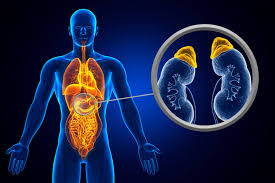 A pair of small glands, each weighing about four to six grams, located just above the kidneys in the rear of the abdomen is known as the adrenal glands. They secrete a number of hormones which are indispensable to sustaining the regular functions of the human body. Adrenal diseases typically manifest when a local tumor is formed, either benign or malignant, and/or an overactive adrenal gland making increased amounts of any of the adrenalin hormones.
A pair of small glands, each weighing about four to six grams, located just above the kidneys in the rear of the abdomen is known as the adrenal glands. They secrete a number of hormones which are indispensable to sustaining the regular functions of the human body. Adrenal diseases typically manifest when a local tumor is formed, either benign or malignant, and/or an overactive adrenal gland making increased amounts of any of the adrenalin hormones.
The major adrenal disorders are (too much adrenalin) pheochromocytoma/paraganglioma, (too much cortisol) Cushing’s syndrome, and (too much aldosterone) primary hyperaldosteronism.
The two most followed methods for performing adrenalectomy or surgical removal of the adrenal gland/s are minimally invasive and open operation.
Steps
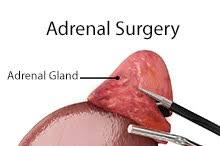 Doctors used to make a large half to one-foot-long incision in the back, flank, or abdomen to remove any tumor in the adrenal gland in the past. Presently, with the help of minimally invasive surgery, medically known as laparoscopic adrenalectomy or laparoscopically removing the adrenal gland, can be done by making three or four incisions that are as small as a quarter to half an inch.
Doctors used to make a large half to one-foot-long incision in the back, flank, or abdomen to remove any tumor in the adrenal gland in the past. Presently, with the help of minimally invasive surgery, medically known as laparoscopic adrenalectomy or laparoscopically removing the adrenal gland, can be done by making three or four incisions that are as small as a quarter to half an inch.
- The surgery is done under general anesthesia to make the patient unconscious during the entire procedure.
- A narrow tube-shaped instrument called a cannula is put into the upper abdomen or flank right under the ribs of the patient.
- A tiny telescopic device known as a laparoscope connected to a highly sophisticated camera is passed through the cannula. It provides an enlarged view of the internal organs of the patient on a computer monitor.
- Other cannulas are also inserted to allow the doctor to carefully separate the affected adrenal gland/s from the tissues. The operated adrenal gland is placed in a tiny bag after being dissected free and then extracted through any of the incisions made. Removing the entire adrenal gland for safe removal of the tumor is almost always a dire necessity.
- The opened incisions are closed after the removal of the adrenal gland/s.
Note: The laparoscopic procedure cannot be done in a few patients, and open surgery is performed in such exceptional cases.
Benefits
Patients may be discharged one to two days after the surgery and could resume work faster than those recovering from open surgery. Outcomes of operation may vary and depends on the opted procedure and the overall condition of a patient. The most common benefits are as follows:
- Shorter hospital stay
- Less postoperative pain
- Improved cosmetic result
- Faster return to routine activity
- Reduced risk of wound separation or herniation
Complications
Research has observed that a surgeon’s experience is directly associated with the risk potential of any complications that could be caused by surgery of the human adrenal gland/s. As such surgeries are reasonably uncommon, it is crucial to find a doctor who specializes in operative procedures of this vital gland.
Precautions
Patients should not engage in vigorous activities and avoid heavy lifting (anything that weighs more than ten pounds) for a month typically to minimize the odds of developing a hernia at the incision site. They may take a shower two days after the operation, but should not bathe and swim for a week to avoid submerging the incision area in the water.
Prognosis
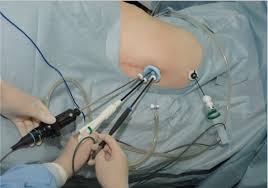 The overall time for recovery is variable and differs from case to case. After laparoscopic adrenalectomy is performed, a vast majority of the treated patients usually resume their routine activities after a fortnight or a month. The overall recovery holiday after open adrenalectomy is substantially slower and one to one-and-a-half month’s time is generally required for recuperation.
The overall time for recovery is variable and differs from case to case. After laparoscopic adrenalectomy is performed, a vast majority of the treated patients usually resume their routine activities after a fortnight or a month. The overall recovery holiday after open adrenalectomy is substantially slower and one to one-and-a-half month’s time is generally required for recuperation.
Conclusion
In order to do an adrenal surgery successfully, apart from the procedural skills, one also needs careful judgment as well as a sound understanding of anatomy, relevant hormone physiology, and radiology. There are many technical approaches for such operations and choosing the appropriate one needs proper knowledge of the past medical history of the patient, the anatomy of that particular patient and the lesion, and the surgeon’s skill set as well.
Contact us today to schedule an appointment or undergo a consultation from our experts.
References















